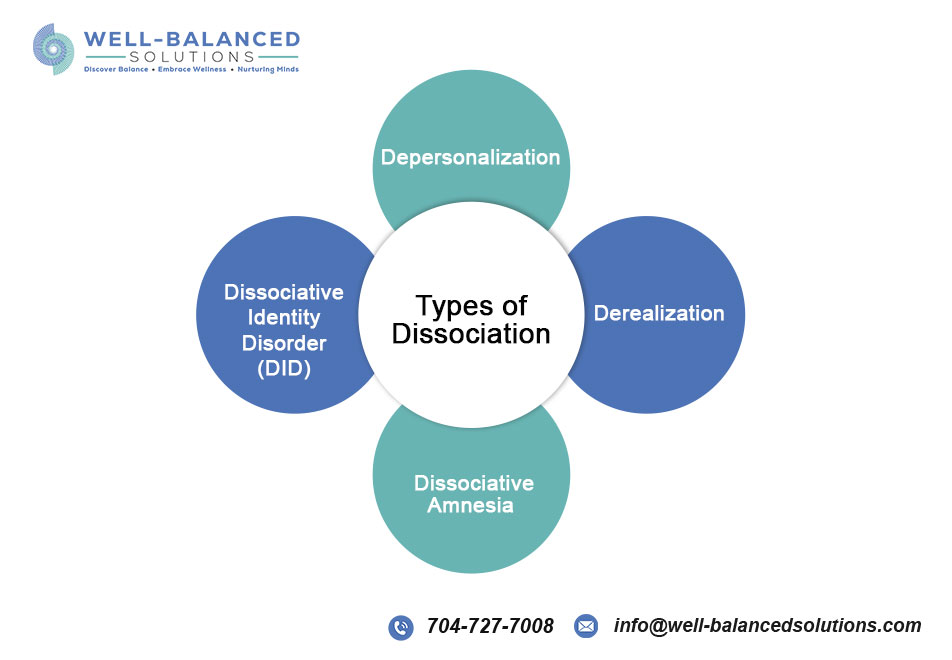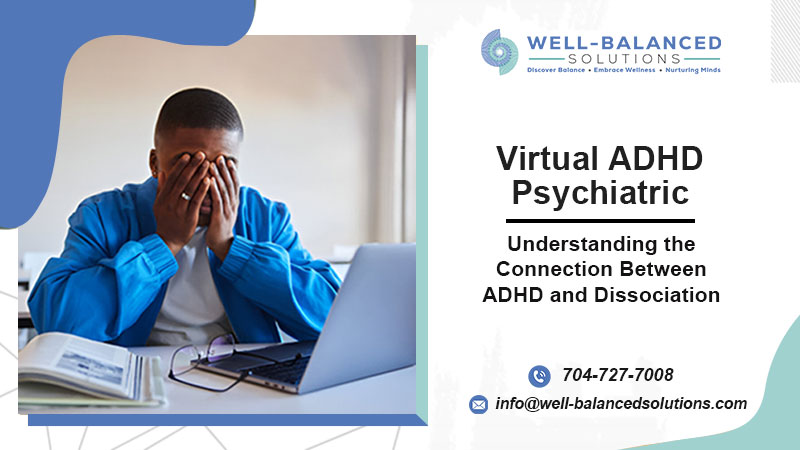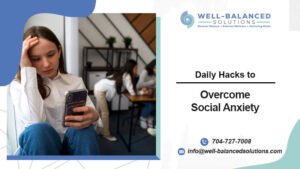Dissociation and ADHD can have big effects on daily life and mental health, and most of the time, people don’t even realize it. ADHD is a neurological disorder that makes it hard to concentrate, control your impulses, and be active.
Up to 73% of individuals with ADHD use dissociation to cope with stress, emotional distress, and sensory overload (Liss et al., 2019).
Getting the right evaluation and treatment for ADHD is very important. This is where professional help from a psychiatric comes in. A psychiatric can help handle ADHD symptoms and deal with dissociative tendencies by tailoring treatment and medication to each person’s needs. People can take steps toward early intervention and a better quality of life by understanding the link between these conditions.
Understanding ADHD and Its Symptoms
Attention-Deficit/Hyperactivity disease, or ADHD, is a neurodevelopmental disease that causes people to be impulsive, not pay attention, and be hyperactive. It makes it hard for kids and adults to concentrate, stay organized, and control their impulses.
Having trouble staying focused, being restless, forgetting things, and making snap decisions are all common signs. Some types of treatment are behavioral therapy, medicine, and changes to one’s lifestyle.
More Than 15 million US adults have ADHD, New study estimates.
Symptoms Of ADHD
Inattention:
- Problems maintaining focus
- Making foolish mistakes often
- External triggers can be easily distracted
- Task and activity management issues
- Lost keys, school supplies, etc. frequently
- Disliking mental-intensive tasks
- Forgetting daily tasks
Hyperactivity & Impulsivity:
- Squirming or moving constantly
- Inability to sit when needed
- Talking too much or interrupting
- Trouble waiting turns
- Impulsive action
- Unsuitable running or climbing
- Being restless or “on the go”
What is Dissociation?
Dissociation is a psychological state in which an individual experiences a sense of disconnection from reality, themselves, or their surroundings. It is often described as feeling detached or “zoned out,” with varying degrees of intensity.
Types of Dissociation:

- Depersonalization
When people sense detachment from their emotions and physical body they feel like observing themselves from the outside.
- Derealization
People who experience derealization perceive the world as unreal, out of reach, or strongly distorted.
- Dissociative Amnesia
Memory lapses have no link to typical forgetting and cannot be understood.
- Dissociative Identity Disorder (DID)
DID represents a serious mental illness that causes patients to live with various personality states that exist independently from one another.
Common Causes and Triggers
Dissociation can occur due to various factors, including:
- Trauma or stress
- Overwhelming and sensory overload.
- Anxiety and depression
The Link Between ADHD and Dissociation
Problems with focusing, impatience, and being too active are all linked to ADHD. A less well-known aspect of ADHD is that it may be linked to dissociation, a mental state in which a person separates from their thoughts, feelings, memories, and environment. Understanding this link is important for accurate diagnosis and treatment, especially for people who have both illnesses.
ADHDers are 2.5 times more likely to develop dissociative disorders According to Matthies & Philipsen (2016),.
ADHD can make it hard to control your emotions, pay attention, and make decisions. All of these things can make dissociative attacks worse. People with ADHD often have strong emotional reactions, trouble processing stimuli, and a lot of mental fatigue, all of which can make dissociation as a way to cope more likely.
The Role of an ADHD psychiatric in Managing Symptoms
ADHD/dissociative patients must seek expert help. ADHD psychiatrics diagnose and treat ADHD and co-occurring illnesses including dissociation. With more telehealth programs, seeing an ADHD psychiatric online can be convenient and beneficial.
To accurately diagnose ADHD, online psychiatrics evaluate symptoms to distinguish it from other mental health issues. It also allows ADHD patients to consult professionals remotely without traveling. ADHD psychiatrics also provide individualized treatment strategies for ADHD and dissociative symptoms.
Treatment Approaches – Therapy, Lifestyle Changes And Medication
Managing care of ADHD and dissociation needs a multi-faceted method of treatment, which may include:
- Cognitive-behavioral therapy (CBT)
- Mindfulness and Grounding Techniques
- Medication Management
- Lifestyle Modifications
Benefits of Consulting an Online psychiatric For ADHD
-
Accessibility and Convenience
Online ADHD psychiatry removes barriers like long wait times, travel, and scheduling conflicts, allowing patients to connect with licensed professionals from home. Flexible appointments fit into busy schedules, reducing the need to miss work or school. Those in remote areas can access specialized care without geographical limits, while a familiar setting helps ease anxiety and improve treatment engagement.
-
Personalized Treatment and Telepsychiatry Benefits
Telepsychiatry ensures individualized ADHD treatment using evidence-based methods. Online psychiatrics conduct comprehensive assessments, prescribe and adjust medications, and integrate behavioral therapies like cognitive-behavioral therapy (CBT) and ADHD coaching for effective symptom management.
Finding an Online ADHD psychiatric in Virginia and Other Locations
Finding a trustworthy online psychiatric is very important for people in Virginia or other states who want to get help for ADHD. Here are some important things to think about:
Licensing and Credentials: Ensure the psychiatric is board-certified and licensed to practice in your state.
Telehealth Platform Quality: Choose a secure and HIPAA-compliant platform to protect your privacy.
Specialization in ADHD: Look for professionals with experience in treating ADHD across different age groups.
Insurance and Payment Options: Verify coverage with your insurance provider or explore affordable self-pay options.
A lot of telehealth programs offer ADHD treatment, making it easy for people who need professional help to get it.
Closing Thoughts!
Professional help becomes essential for ADHD patients because the condition causes dissociation alongside other cognitive difficulties. The online consultation with an ADHD specialist allows patients to learn symptom management.
The appropriate drug therapy and medical interventions together with behavioral adjustments are made possible through expert ADHD treatment.
Professional assistance provides valuable benefits to address ADHD symptoms and improve the condition of both yourself and your family members who have ADHD.
Contact the Well-Balanced Solutions Mental Health and Wellness Center immediately to experience ADHD expertise. Skilled online psychiatrists build customized treatment strategies for all patients to offer accessible, compassionate psychiatric care. Prioritize your mental health today through consultation booking.
Resources Links
Online ADHD Treatment From a psychiatric | Talkiatry
Find An ADHD psychiatric For Adults Online Or Local
More than 15 million US adults have ADHD, new study estimates | Reuters







